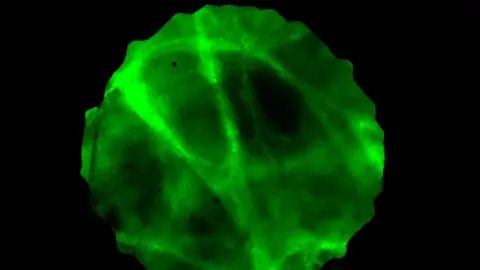Coronavirus: Drugs to be tested on lungs of ICU patients
 University of Bath
University of BathMedicines will be tested in the lungs of patients in intensive care in order to fast track new treatments for Covid-19.
The "STOPCOVID" initiative at Edinburgh University is to use existing drugs provided by leading drug companies and smaller biotech firms.
The team has unique expertise in administering drugs in the lung and assessing if tissues heal.
The project has been given the backing of top scientific and medical advisors.
The system involves sending medicines to the outermost portion of the lung, which are the areas that are damaged and inflamed among those with severe symptoms of Covid-19.
The researchers are also able to see whether the drug is working using a fibre-optic camera inserted into the lung and so-called "chemical probes" inserted into the area, which indicate whether the damaged tissue is becoming less inflamed.
'Stop lung inflammation'
The system was developed as part of a research project to treat a variety of lung disorders. But, according to Prof Kev Dhaliwal, of Edinburgh University, it is ideal for testing new drugs to combat the current pandemic.
"Currently 50% of patients who are admitted to intensive care with the Covid-19 die. The key to improving those odds is to stop that lung inflammation from occurring is absolutely crucial," he told BBC News.
The team has a list of anti-inflammatory and anti-microbial drugs that it plans to test on those in critical care. Many of those are involved are clinicians treating Covid-19 patients.
"It's been humbling to see the response," says Prof Dhaliwal. "No one is asking for any extra money - they just voluntarily got on with it - working all hours seven days a week."
"We have an incredible scientific community and they are galvanizing themselves to slow down this dreadful disease and save lives."
Up to 150 researchers are involved in the study. As well as clinicians, the team also includes scientists and engineers who have dropped their normal projects to work on the STPCOVID project.
"Normally it would take months to get a single drug into a clinical trail. We are trying to do this in weeks," Prof Dhaliwal says.
"We want to get our results out there as fast as possible so that any promising drugs can be put into clinical trials straight away."
Scientists working together
The team believes new therapies could be discovered and implemented before a vaccine becomes widely available by repurposing medicines for other conditions that are already in clinical use or are currently being tested.
The initiative will be based at Edinburgh BioQuarter, which will bring together scientists from the Centre for Inflammation Research, clinical research teams in NHS Lothian and University of Edinburgh, regulatory teams, and clinical trial networks. Drug manufacturing facilities on site will allow for quick testing of potential treatments.
The Medicines and Healthcare products Regulatory Agency (MHRA) has agreed to work closely with the team to fast track any potentially successful work while following due diligence. Any drugs that provide positive early results will be rolled out as part of national and international clinical trials through the UK Trials Platform.
STOPCOVID has secured £2 million funding from LifeArc, a medical research charity. It aims to raise a total of £15 million from the private sector. Discussions are continuing with other potential partners.
